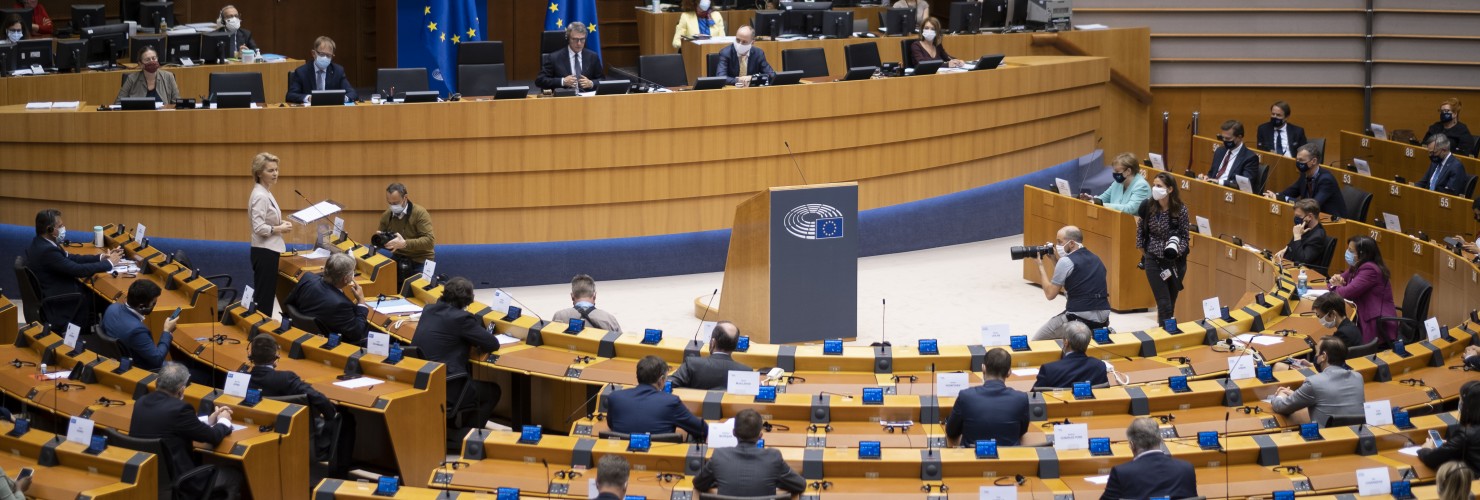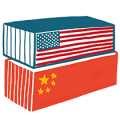

The EU, China and America: Hanging in, by their teeth and nails
Only a European Union that is taken seriously by Washington and Beijing would offer the chance to modify and transform the bipolar world order into one that remained pluralistic and genuinely multilateral, rather than hierarchic and polarized, argues Hanns W. Maull.
As the world settles into what is likely to be a prolonged period of bipolarity, in which much of global affairs will revolve around the bilateral relationship between America and China, Europe struggles to find its role. Its economic weight - the EU’s GDP at purchasing power was estimated by the CIA at USD 19.9 tr in terms of purchasing power in 2019 - certainly puts it in the same league as the United States (USD 20.5 tr) and China (USD 22.5 tr), and the same also holds for other measures of power, such as population or military expenditure. Therefore, the EU could be expected to represent– in principle - a third pole in world affairs.
And the ambition certainly exists: the buzzwords in Europe’s foreign policy discourses these days are “strategic autonomy” and “European sovereignty”. The present President of the European Commission, former German Minister of Defence Ursula von der Leyen, came into office with the avowed ambition to lead a geopolitical Commission; the Union would have to “relearn the language of power”, according to the EU’s Foreign Policy czar Josep Borrell. Yet, in practice the doubts persist: can the European Union, a grouping of 27 very different nation-states each jealously guarding its sovereignty, really act as one to live up to these aspirations?
Europe needs to hold its ground in great power politics
What Europe needs to achieve in the game of geopolitics is clear enough. It needs to hold its ground in the rough and tumble of great power politics, to protect and promote its own interests and values. It needs to ensure an international order that is both compatible with its own principles and effective in meeting global challenges, such as climate change or the proliferation of weapons of mass destruction.
To achieve this, the European Union needs to be, or needs to become, what in the jargon of International Relations theory is called a “significant alter” to both America and China. That is, its views and policy suggestions need to be taken seriously and heeded in the corridors of power in Washington and Beijing.
The stakes in this game are high, and not only for Europe itself: ultimately, they are about the future shape of the international order. At present, world politics is at a crossroads, with paths leading in three different possible directions: bipolarity hardening into a new Cold War, giving way to a new unipolar moment, or evolving into a new, pluralistic multilateral order in which liberal democracies can continue to prosper.
Each of those three different worlds, characterized alternatively by persistent tensions, unipolar domination, or a concert of powers, would be the outcome of the power struggle between the two new Superpowers America and China, as well as other great and smaller powers, including the European Union.
This struggle will be animated by different models for multilateral global governance: China’s version of multilateralism, last promoted by President Xi Jinping’s virtual address to the Davos World Economic Forum, America’s version under President Joe Biden that is beginning to take shape, and other versions, including that of the European Union. Yet probably only a European Union that is taken seriously by Washington and Beijing would offer the chance to modify and transform the bipolar world order into one that remained pluralistic and genuinely multilateral, rather than hierarchic and polarized.
To be taken seriously would require a European Union able and willing to fend for its own interests and values, but also to talk “truth to power” both in Washington and in Beijing. “Able and willing” implies a European Union that is capable of formulating and implementing a coherent and consistent strategy, acting as one, and that has the clout and determination to make itself heard. Its most important sources of power in this context are its ability to regulate one of the biggest single markets in the world, and its soft power as an attractive socio-economic and political model.
The Biden administration is as pro-European as you could get these days
Whether Europe can deliver on this demanding geopolitical agenda remains to be seen. Take relations with America first. The EU has come forward with wide-ranging proposals for re-setting transatlantic relations, and the Biden administration is as pro-European as you could get these days in Washington; it understands that America needs to work with allies and will therefore be inclined to view Europe again as its close partner. Yet its patience will not be infinite, and ultimately Washington needs a European Union that is capable of strategic action. Unlike the previous administration, the Biden administration would try to accommodate such a Europe.
In its relationship with China, the EU has already passed a litmus test for its geopolitical ambitions, albeit with mixed results. The Comprehensive Agreement on Investment (CAI) was concluded during the last days of December and therefore before the Biden administration took office, against the warnings of, inter alia, a prominent group of European China scholars and experts. In Europe, CAI subsequently has widely been criticized, mostly for its geopolitical shortcomings: Beijing claimed it as proof that the European Union was China’s partner, thus undercutting efforts to build a transatlantic coalition against China.
The simplest way to characterize Europe’s performance in the context of CAI is that the EU wanted to have its cake and eat it. “Eating the cake” refers to the concessions Beijing is willing to make to European commercial interests in certain industrial and service sectors in China; “having the cake” relates to the second prong of EU policies towards China. The EU is building up a toolbox against China’s mercantilist practices in Europe, such as investment screening and regulations aimed at unfair advantages enjoyed by state-owned enterprises.
With this, Europe hopes to get economic policy leverage so as to hold Beijing to its lofty declarations of intent and its promises. Part of this second prong of the European China policy is the fact that CAI still needs to be approved and ratified by all EU member states and the European Parliament; this will allow for an evaluation of China’s performance in implementing its pledges. Overall, CAI and the EU’s unilateral toolbox are to provide the foundations for a broader, geopolitically informed European strategy towards China, which reflects the complexity of a relationship that combines aspects of cooperation, competition, contestation and systemic rivalry.
The Comprehensive Agreement could yet unravel in the process of ratification; the support of the European Parliament, in particular, is far from assured. If the deal fell apart, this would expose the fissures within the European Union on policies towards China and expose the lack of cohesion and coherence in the EU’s external relations. If the CAI survived, this would demonstrate that the EU is capable of developing and implementing a unified approach towards China - no mean feat in itself, given the complexities of decision-making in the European Union.
This achievement would be overshadowed, however, by the way it was conceived - bilaterally, without any possibility to consult and coordinate with the incoming new American administration (which was barred from engaging with the EU at this stage), and as a cynical European riposte to Donald Trump’s bilateral trade deals with China, rather than a far-sighted, seriously geopolitical move.
CAI is likely to be the last chapter in Europe’s past approach towards China
Whatever the ultimate fate of the CAI, it is likely to be the last chapter in Europe’s past approach towards China, rather than the beginning of a new dawn in China-Europe relations. Its substance reflects above all the commercial interests of Germany’s car manufacturers and other industrial behemoths such as Siemens and BASF.
Within the EU, Germany’s commercial relationship with China is an outlier: Germany alone accounts for almost half of the EU’s exports to China, but only 31 per cent of the block’s exports to the U.S.. About 5,200 German companies are active in China, many of them industry leaders; the two countries are connected through a dense web of transnational supply chains. The Agreement was pushed through by Germany, which at that time held the rotating chair of the EU, as part of the political legacy of Chancellor Angela Merkel.
Merkel had defined the European relationship with China as one of her key ambitions for the German presidency of the EU in the second half of 2020. Originally, she had hoped to secure the Agreement during an EU-China Summit planned in the city of Leipzig in September 2020, but the pandemic forced this summit to be held virtually. It failed to produce an agreement, as President Xi stonewalled.
It was only after the defeat of Donald Trump and the perspective of a Biden administration that Beijing rushed to make concessions and thus enticed the Europeans into an agreement that may offer modest commercial benefits but fails to live up to the EU’s broader geopolitical ambitions. A phone call placed by Xi to Merkel right after the U.S. elections seems to have played a key role in this context.
In the future, relations between Europe and China will come to reflect the new realities - within China and of China in the world. The People’s Republic of China is not quite what the Europeans long assumed it to be: a docile student, to be moulded in the West’s image into a partner. Rather, China is a “power trader” that pursues economic prosperity as a means to realize national ambitions, under the leadership of the Chinese Communist Party and with the Party firmly in charge.
As this has become clearer, public attitudes towards China have darkened significantly across Europe, though with important differences between member countries. Elated hopes about the gains to be reaped from engaging with China economically and diplomatically have been dampened, even in Germany: in 2019, the Confederation of German Industry published a seminal paper with a new, much more sober assessment of China’s economic policies.
Eastern Europe, erstwhile gung-ho about the partnership, has soured somewhat on the 17+1 process that brings together China with twelve member states of the EU (thus driving a wedge into EU unity) and five neighbouring countries on the Balkans, The 5G debate has sharpened awareness about possible security risks related to Chinese activities in Europe.
Future relations between Europe and China will therefore reflect the co-existence of cooperation, competition and systemic rivalry that the EU already foresaw in 2019. There will be no de-coupling from China, but greater caution and efforts at reducing vulnerabilities, as well as more cooperation and coordination with allies and partners on countering China’s ambitions.
Yet predicting the obvious - a more strained bilateral relationship - only underlines the need for a European capacity for sustained and strategically serious collective action. How to reconcile cooperation with contestation and containment in relations with China will be a major challenge for the European Union.
In Brussels, there are many centres of power - the European Commission, the High Representative of the Common European Foreign and Security Policy, the President of the European Council, the Council of Ministers and the Permanent Representatives of the member states, and the European Parliament. To get them all on the same page with a text that represents more than a low common denominator requires considerable political energy and astute leadership; to get the European Union in its entirety to pursue a coherent and consistent strategy is more difficult still.
Will the European Union be up to this challenge in its future relationship with China? Who will step into Angela Merkel’s large shoes when she bows out in September? Whatever the answers to these questions, they will profoundly affect the strategic US-China-EU triangle and hence the relationship between America and China.
This article was first published at amcham-shanghai.org.


